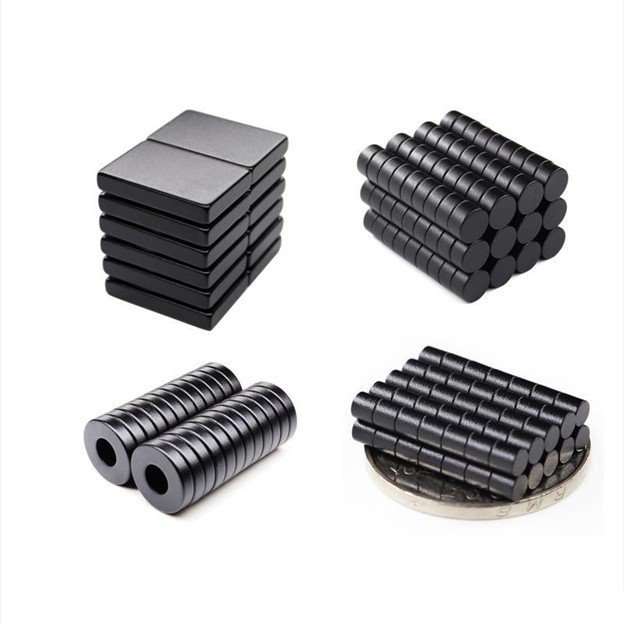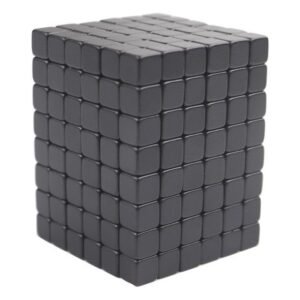
Epoxy Coated Magnet For Sale
Maximum temperature resistance: up to 380 ℃
Salt spray resistance: over 72 hours
Coating thickness: 10–25 µm, compound up to 35 µm
Common epoxy colors: black, white, customizable
Epoxy-coated neodymium magnets feature a protective polymer layer, typically black or gray in color, offering robust corrosion and moisture resistance. This makes them suitable for outdoor, marine, and high-humidity environments. While the coating prevents rusting, it is prone to surface cracking under significant mechanical stress. It is widely used in industrial, automotive, and marine applications.
Epoxy Coating for Magnets
Epoxy coating is polymer-based coatings that we commonly apply to various surfaces to protect and improve their look. They have two components – a resin and a hardener – that are combined to form a robust, long-lasting, and weather-resistant coating.
Besides neodymium magnets, Epoxy coating also have wide applications in metal, wood, and concrete surfaces because of their outstanding chemical resistance, durability, and adherence. They are a common option for industrial and commercial applications since they can tolerate significant wear and tear and are resistant to dampness.

Basics of Epoxy coating
As for neodymium magnets, the epoxy coating can provide them with a firm, long-lasting layer of protection. The purpose is to shield them from deterioration, water damage, and other sorts of negative impacts, which can make the magnets corrode even in a few hours.
Talking about the methods to apply Epoxy, it’s common to see people do this using a brush, or roller for wooden tabletops, floors, etc. But for neodymium magnets, we use sprayers to apply Epoxy coating precisely at a comparatively faster speed.
Epoxy coating come in a wide variety of forms, each with unique characteristics and applications. Some Epoxy coating is developed for use on wood or metal surfaces, some are made for use on concrete floors. And as for neodymium magnets, Osenc chooses the epoxy coating that is optimized for industrial applications.
The most common color for Epoxy coating is black, but you can also have the white color upon request. As for other colors, they are possible, and the only thing is we need to consider the cost-effectiveness. We will need to ask the coating technique partner to customize the properties.
Features of neodymium magnets
Epoxy coating is known for their excellent adhesion, chemical resistance, durability, and toughness. They are commonly used as protective coatings for a variety of surfaces, including concrete, metal, wood, and fiberglass. Some of the typical features of Epoxy coating for general purposes include:
- Adhesion: It has excellent adhesion to a wide range of surfaces, even without necessary surface preparation. You don’t have to worry about the quality of the bonding effects. This makes them ideal for use as protective coatings in a variety of applications.
- Chemical resistance: It is resistant to a wide range of chemicals, including moisture, water, acids, bases, and solvents. This makes them ideal to use on neodymium magnets for general applications in environments where chemical spills or leaks may occur.
- Durability: Epoxy has excellent durability and wear resistance. They can withstand heavy traffic and harsh environments. Once you apply them on neodymium magnets, you won’t need to worry that they may degrade in a short time.
- Toughness: Epoxy is tough and resistant to impact and abrasion. This makes them ideal for use in applications where the coating may be subject to wear and tear. Typical examples can be disc and button neodymium magnets. Most of them function as organizers and we touch them frequently every day.
- Versatility: We can use Epoxy in a wide range of applications, including flooring, walls, countertops, and more. We can apply them in thin layers or as thick, structural coatings, depending on the specific needs of the application.
- UV resistance: Some Epoxy coating is formulated with UV inhibitors to protect the coated surface from fading or discoloration due to exposure to sunlight.
- Low VOCs: Many Epoxy coating is low in volatile organic compounds (VOCs), which makes them more environmentally friendly and safer to use in indoor applications.
Advantages of Epoxy coating on neodymium magnets
1). Maximum temperature resistance up to 380℃
This temperature is higher than the recommended working temperatures for the highest-grade magnets. That means you don’t need to worry about the coating itself.
2). Resistant to moisture, alkali, and acids
That means this type of coating is good for neodymium magnets for some special working environments, such as laboratories, workshops, and even kitchens.
3). Wide range of colors
Technically speaking, Epoxy coating can have unlimited colors to choose from, as long as you can justify the cost-effectiveness. The coating technique partner modifies the properties and they will be able to create new colors.
4). No hanging point
In order to spray coatings on the neodymium magnets, we will need to use a rack or something to hang the magnets one by one. The point that touches the hanging rack is a hanging point. The negative effect of hanging points is that those spots are thinner or even uncovered. For the Epoxy coating, workpieces don’t have hanging points.
5). Salt spray resistant up to 72 hours
The Epoxy coating can last for more than 72 hours in a general salt spray test. We can say this is a good result considering their common applications.
6). Coating thickness
In case you may need, it is possible to achieve thick layers of Epoxy coating on the workpieces’ surfaces, which can be double and even triple the thinnest coating, up to 10-25um, compound coating up to 35um.
7). Smooth and beautiful surfaces
If the coating is very thin, then it is very likely that the surfaces won’t look quite smooth. Comparatively speaking, the epoxy coating is much thicker, so their surfaces look smoother and more beautiful. This feature is useful for magnets with decorative purposes.
Disadvantages of Epoxy
Just like anything else, Epoxy coating is not perfect or without a single disadvantage. Epoxy coating have several potential disadvantages, including:
- Drying time: Epoxy coating typically have a longer drying time than other types of coatings, which can be inconvenient for production with tight schedules.
- Sensitivity to temperature: Epoxy coating can be sensitive to temperature and may not cure properly if applied in extreme heat or cold.
- Vulnerable to UV light: Epoxy coating can become yellow or fade when you expose them to UV light, which can affect the appearance of the finished products.
- Odor: Some Epoxy coating may have a strong, unpleasant smell when applied, which can be unpleasant for those working with the material.
- Surface imperfections: Epoxy coating can highlight surface imperfections, such as dents or scratches, which may not be desirable for some applications.
Common quality issues
If you don’t apply the Epoxy coating properly, there are several potential quality issues that can arise. They include:
- Poor adhesion: Epoxy may not adhere properly to the surface if it is not properly prepared or if the coating is applied too thickly.
- Delamination: Epoxy may delaminate, or peel away from the surface, if the coating is not applied evenly or if it is subjected to extreme temperature fluctuations.
- Blushing: Epoxy may develop a white, cloudy appearance, known as blushing, if they are applied in high humidity or if they are not allowed to dry properly.
- Bubbling: Epoxy may develop bubbles if the coating is applied too thickly or if it is applied in a location with high humidity.
- Cracking: Epoxy may crack if they are subjected to extreme temperature fluctuations or if they are applied over a surface with a lot of movement.
As a custom neodymium magnet supplier, Osenc always keeps an eye on such potential quality issues with Epoxy coating. Will not leave those defective products to our customers.

